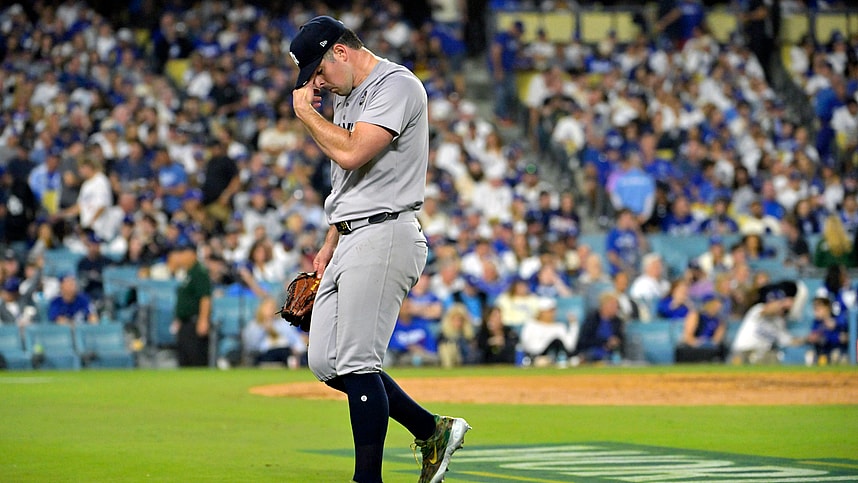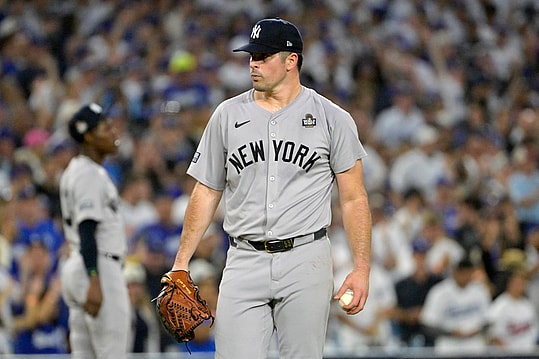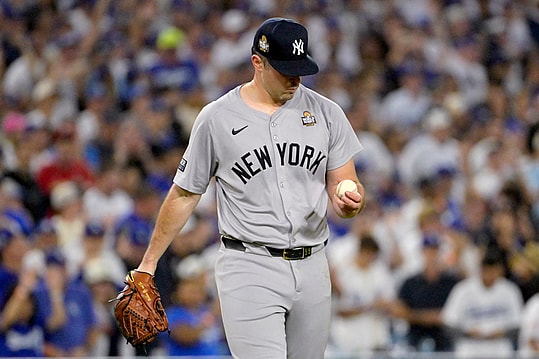
Yankees manager Aaron Boone made a critical error in Game 1 of the World Series by calling on Nestor Cortes to face the heart of the Los Angeles Dodgers lineup. Having not pitched since September 18 and still nursing an injury, Cortes was unprepared for the moment and ended up allowing a walk-off grand slam to Freddie Freeman, deflating the Yankees’ morale from the outset.
The obvious choice would have been to rely on Tim Hill, who had performed exceptionally throughout the postseason and earned a chance to close.
Unfortunately, Boone’s questionable decision-making continued in Game 2, this time with the starting rotation. Despite Clarke Schmidt being statistically the stronger choice on the road, Boone opted for Carlos Rodon as the Yankees’ Game 2 starter.
We previously analyzed Schmidt’s road versus home splits, revealing a significant advantage on the road, where he holds a 1.39 ERA over 45.1 innings, allowing a .211 batting average and a .280 slugging rate. Conversely, Schmidt has a 4.50 ERA and has allowed a .250 batting average at home.

Rodon’s Struggles Highlight Poor Decision-Making
Despite the clear statistical edge Schmidt offered as a Game 2 road starter, Boone chose to stick with Rodon, the team’s number two starter this postseason. This choice was driven more by loyalty than logic. Rodon struggled in his 3.1-inning outing, surrendering four earned runs and three home runs on just 63 pitches. In the biggest start of his career, Rodon faltered, yet much of the blame falls on Boone for placing him in a disadvantageous situation.
While Rodon should be counted on to deliver in a World Series setting, Boone’s decision to ignore the metrics was puzzling. This season, Rodon has been far better at home, holding a 3.11 ERA and a .204 batting average against. On the road, however, his ERA climbs to 4.69 over 94 innings. Boone had every data point necessary to make the best choice for the Yankees but instead leaned on instinct over analytics.

Misplaced Loyalty or Overthinking Strategy?
After a well-managed ALDS and ALCS, Boone’s decision-making in the World Series has taken an unexpected turn, marked by overthinking and misplaced loyalty. In Monday’s Game 3, Schmidt will now pitch in the Bronx, where his numbers are markedly weaker, creating a statistically disadvantageous situation. Boone’s hesitation to make the analytically sound choice has left the Yankees scrambling for answers at the most crucial moment of the season.
- Buy or Sell? Yankees who are making changes that matter in Spring Training
- Yankees’ Ryan Weathers might’ve just discovered how to stay healthy
- Yankees’ Jasson Dominguez and Spencer Jones might’ve just got crushed
Moving Forward: Learning from Missteps
If the Yankees hope to stay competitive in the World Series, Boone will need to balance loyalty and instinct with data-driven decisions. With the series returning to the Bronx, the Yankees will need every strategic edge they can muster to make up for the early setbacks. The road forward will test Boone’s resolve and ability to adapt under pressure, as one more strategic misstep could determine the team’s fate on the biggest stage.
More about:New York Yankees